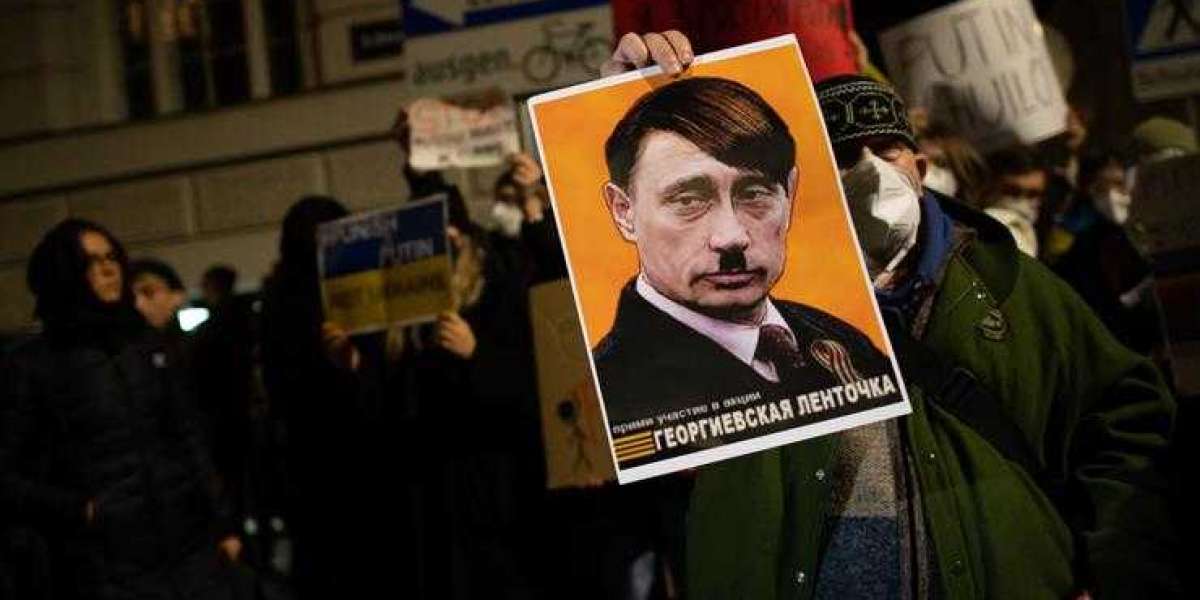As the prospective invasion of Ukraine loomed and then unfolded on the ground, my Bard College students and I were exploring the evolution of European and global collective security measures in a course called “Diplomacy in International Politics.” Sadly, our timing could not have been better. Our readings came to life as the most recent attempt to codify collective security – the United Nations – all but died. Established in 1945 by the nations that had united to defeat Nazism and fascism, the successor to the League of Nations ended up with Adolf Hitler (in the form of Russian President Vladimir Putin) alive, well, and ensconced in its very heart: the Security Council.
The U.N. will not, to be sure, pack up and abandon its Turtle Bay headquarters on Manhattan’s East River. As an international bureaucracy it will likely, through sheer inertia, grind on indefinitely. But the decision of Putin to inflict invasion and state terror on Ukraine is a knife to the heart of the U.N.’s raison d’etre. It was established so that the world’s major powers – defined in 1945 as the United States, the Soviet Union, China, Great Britain, and France – would have a forum in which to cooperate under a set of agreed rules and values to keep the peace and avoid repetitions of 1914 and 1939.
Through over four decades of Cold War, the U.N.’s key organ – the Security Council – struggled to keep the peace. Like each of its five permanent members, the Council as a body often fell short of adhering to the agreed articles of the U.N. Charter. Yet for all its imperfections, it sometimes achieved the consensus it was meant to reflect. But now the resurrection of Hitler in the form of Putin represents, at the very least, an inflection point in the search for a collective security mechanism capable of preventing states from doing their worst.
The genesis of collective security is found in the 1815 Congress of Vienna following the final defeat of Napoleon Bonaparte. The idea – new at the time – was that the great powers of Europe (including the defeated but Napoleon-free France) should subscribe to a set of rules and values embodying a balance of power designed to prevent the rise of another European hegemon. The aim was not to eliminate war but to limit its aims and impact. The Concert of Europe produced by the Congress of Vienna lasted nearly a century. It survived three acts of Prussian armed aggression (against Denmark, Austria, and France), each instrumental in the creation of a unified Germany. It died in 1914, thanks in large measure to the ambition and incompetence of a would-be Napoleon, Kaiser Wilhelm II of Germany.
The “peace” officially ending the Great War in 1919 did not, unlike the Congress of Vienna, offer collective security partnership to a defeated power shorn of its objectionable leadership. Driven by something new to international diplomacy – public opinion – the elected leaders of Great Britain and France treated Germans as a defeated people to be punished, thereby setting the stage for the rise of Hitler and a second world war. A new international organization transcending Europe – the League of Nations – failed miserably to establish a collective security mechanism to keep the peace, not only in Europe but globally. The only two major powers to partake in the League from beginning to end – France and Great Britain – themselves found it hard to achieve consensus as Germany, Japan, Italy, and the Soviet Union put world peace in peril.
President Franklin Roosevelt’s approach to postwar collective security drew heavily, though not exclusively, on the Congress of Vienna precedent. He did not, however, consider Germany and Japan, albeit shorn of repugnant leadership, to be worthy of central role-playing in a new system. Unlike the 1919 Treaty of Versailles, however, the defeated powers would not be cast adrift and saddled with reparations. Instead, they would be occupied militarily, reconstructed economically, and guided toward democratic governance. Roosevelt’s idea that the world could be stabilized by “Four Policemen” – the U.S., Soviet Union, Great Britain, and China – ultimately took the form of a Security Council, with France added to the group as one of the five permanent members. He hoped the Security Council would replicate the Concert of Europe on a global scale.
The Cold War would test and often neutralize Roosevelt’s vision of the key World War II allies policing the world, just as the Triple Entente and Triple Alliance ultimately compromised the Concert of Europe. Without ascribing to false equivalency, it is nevertheless accurate to say that the two major permanent members of the Security Council – the U.S. and the Soviet Union/Russian Federation – have at times both violated the United Nations Charter and abused their positions as the organization’s leading members. But only twice – in 1962 with the placement of intercontinental ballistic missiles in Cuba by the Soviet Union and in 2022 by Russia’s invasion of Ukraine – have the prospects of another world war been deliberately advanced by one of Roosevelt’s “policemen.” The 1962 crisis was resolved diplomatically in short (if terrifying) order. In 2022, Putin has made clear his desire to conquer a member state of the United Nations and his readiness to reshape Europe violently in accordance with longstanding Russian imperial pretensions. Ironically, a functionary of the new Hitler currently presides over a Security Council created to seal the victory over the original.
Ideally, some combination of Ukrainian armed resistance, Western sanctions, and the unmistakable willingness of the NATO alliance to defend all its members with all means at its disposal will lead to the removal of Putin from Russian politics. But even if it does, should the United Nations march on as if nothing has happened; should it assume that a Putin-free Russia is a suitable leader in the quest for collective security and world peace?
Those inclined to blame America first for the current crisis on the grounds of rapid, post-Cold War eastward NATO expansion forget why countries liberated from Russian colonialism three decades ago demanded membership, and why those demands outstripped any U.S. desire to expand NATO for the sake of expansion. Lithuanians, Latvians, Estonians, Poles, Czechs, Slovaks, Bulgarians, Romanians, and Hungarians all had histories punctuated by Russian imperialism down through the centuries, whether Russia was ruled by tsars, commissars, or former “Young Communists” and KGB operatives now looting their homeland as they slaughter their neighbors. Surely Russians as a people – the creators of one of the world’s great cultures – do not deserve to be punished collectively for the crimes of their current leaders. But the question must be confronted by anyone interested in designing the next framework for collective security: Is Russia capable of useful participation? Or is it simply an entity to be deterred permanently?
A Security Council that can neither stop the wanton slaughter of civilians in Syria nor organize a global response to Putin’s latest criminality has lost the pretense of usefulness. Surely there are good things accomplished globally by other facets of the U.N. system – services worth preserving, even if the massive U.N. bureaucracy requires a major diet. Yet if the Security Council is to provide for collective security and successfully counter threats to the peace, it must either be restructured significantly or abandoned altogether, as was the League of Nations.
The U.N. Charter contains no provisions permitting the ouster of a Security Council permanent member. But restructuring is possible, albeit subject to the support of all permanent members. At present the Council is hobbled by a permanent membership reflecting a 1945 view of global power and crippled by the requirement for permanent five unanimity. Doubling the permanent membership to include Japan, India, and other major states while substituting a supermajority – perhaps seven or eight out of ten – for unanimity in the adoption of substantive Security Council resolutions would be a step toward functionality. The process leading to such a result would, however, be daunting and might not even attract the support of Roosevelt’s current successor or that of the U.S. Congress.
It is, however, possible that the manifestation of Hitler in the Security Council has, for all practical purposes, ended the most recent version of collective security’s 207-year evolution. If something new is to arise in place of the U.N. and its Security Council, no doubt it would draw on a variety of elements from its predecessors. But truly effective collective security depends on the willingness of the leading powers to agree and adhere to common goals, values, and an appropriate structure. Perhaps conditions will not permit, for quite some time, a new or significantly modified approach to collective security and keeping the peace. While Hitler and his political descendants are on the scene, collective defense and armed deterrence by those willing to resist aggression will be mandatory.
For now, however, the clock seems to have turned back not just to 1939 but to Napoleon’s capture of a revolution that took place 150 years earlier. Napoleon and Hitler had to be beaten for postwar collective security arrangements to gradually take shape. So it will be in 2022.
Ambassador Frederic C. Hof is Diplomat in Residence at Bard College. He served as ambassador and special adviser for transition in Syria under President Barack Obama.
The views expressed in this article are those of the author and not an official policy or position of the New Lines Institute.







